Key takeaways
- Critical pedagogy emphasizes co-creation of knowledge, where both teachers and students engage in dialogue to challenge societal norms.
- Paulo Freire’s principles of dialogue, conscientization, and praxis encourage active questioning and reflection, fostering a deeper understanding of education’s political nature.
- Applying critical pedagogy transforms classrooms into spaces of mutual respect and critical engagement, where students feel empowered to examine their own assumptions.
- Reflection on teaching experiences highlights the importance of vulnerability and discomfort in promoting genuine learning and connection with students.
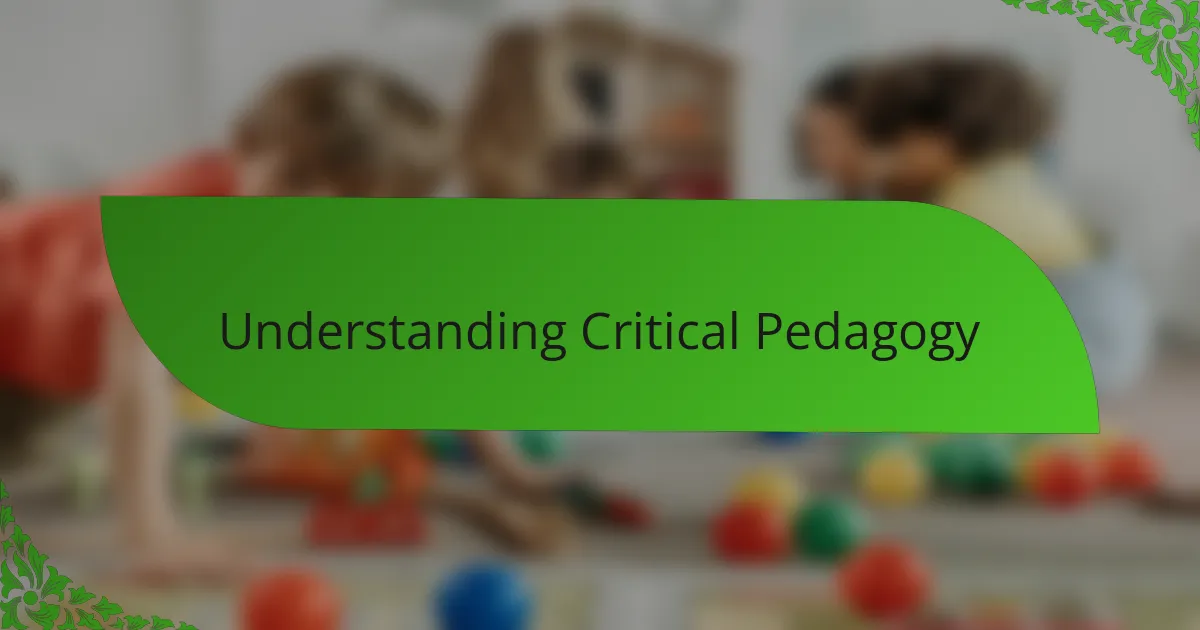
Understanding Critical Pedagogy
When I first encountered critical pedagogy, it felt like a breath of fresh air amid traditional teaching methods. It’s not just about transferring knowledge but questioning the very structures that shape education and society. Have you ever wondered why certain voices dominate classrooms while others remain unheard?
To me, Paulo Freire’s approach opened a door to seeing education as a practice of freedom rather than control. Critical pedagogy invites both teachers and learners to become co-creators of knowledge, challenging oppression and fostering critical consciousness. It’s a continuous dialogue, not a one-way lecture.
Reflecting on my own experience, embracing critical pedagogy transformed how I engage with students. It’s not always comfortable to question entrenched norms, but that discomfort is where real learning begins. Isn’t that what education should be about—awakening awareness, not just filling minds?
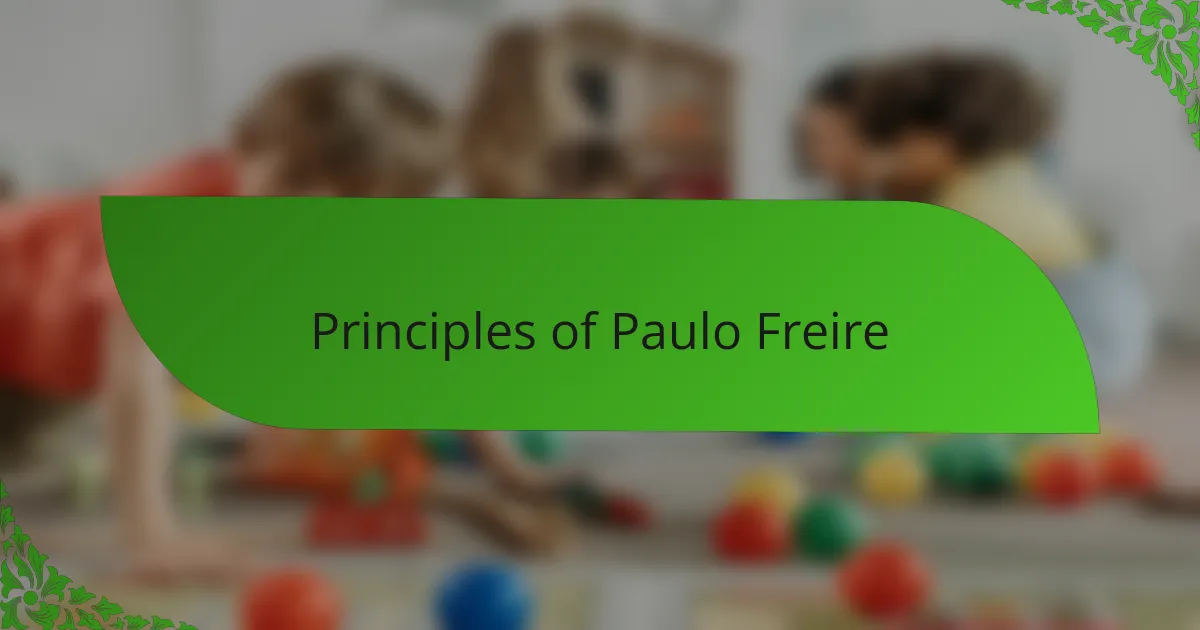
Principles of Paulo Freire
Freire’s principle of dialogue really struck a chord with me; it’s about breaking down the traditional teacher-student hierarchy and recognizing that learning flows both ways. Have you ever noticed how much richer a conversation feels when everyone’s voice truly matters? That’s the kind of mutual respect Freire insists on in education.
Another principle that reshaped my thinking is conscientization—developing critical awareness of the social realities that affect our lives. I remember a moment in a workshop when we paused to question why certain topics were considered “neutral” or “normal.” Suddenly, education wasn’t neutral anymore; it was deeply political and personal.
Freire also believed in praxis, the cycle of reflection and action. This principle reminded me that learning isn’t just theoretical—it’s about taking concrete steps to change the world. It’s challenging, yes, but doesn’t it feel empowering to know that what we learn can inspire real transformation?
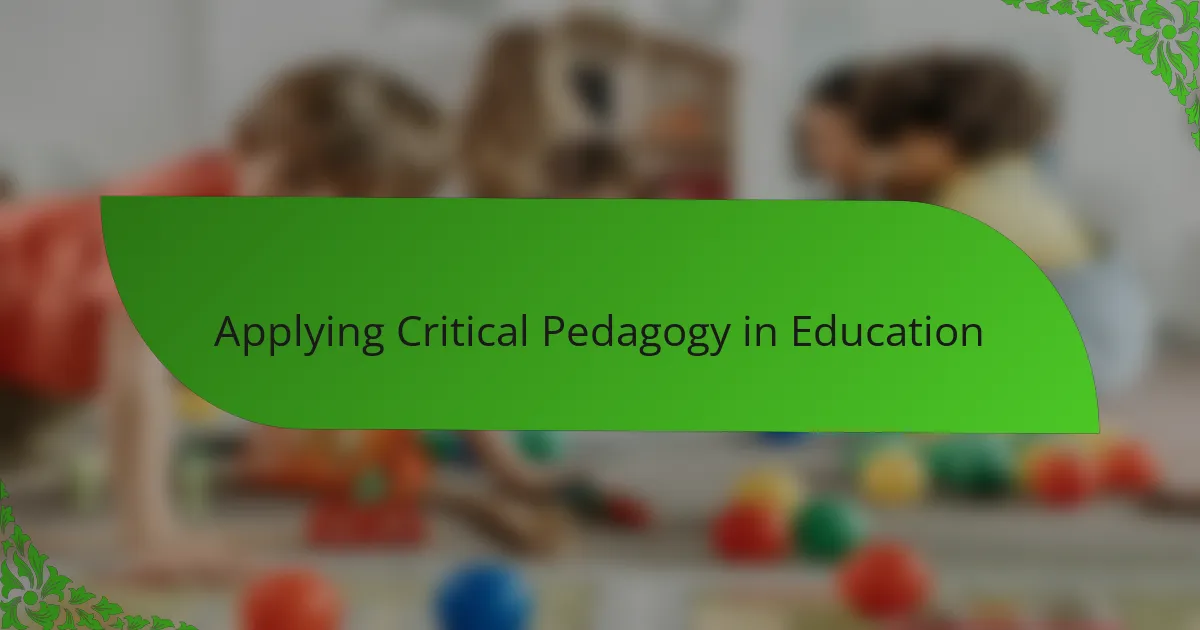
Applying Critical Pedagogy in Education
Applying critical pedagogy in education means creating a space where students and teachers learn from each other, rather than just following a set curriculum. I recall a class where, instead of delivering a lecture, I invited students to discuss their own experiences related to the topic. The energy shifted immediately—learning became alive, personal, and relevant.
One challenge I faced was resisting the urge to control the conversation. It felt vulnerable to let go of the traditional authority I was used to holding. But that vulnerability opened the door for genuine dialogue, where students felt valued and motivated to think critically about their own realities.
What struck me most was how this approach encourages questioning the ‘why’ behind the content. When students ask, “Why does this matter to me?” or “Who benefits from this knowledge?” the classroom transforms from a place of passive reception to active engagement. Isn’t that the heart of true education?
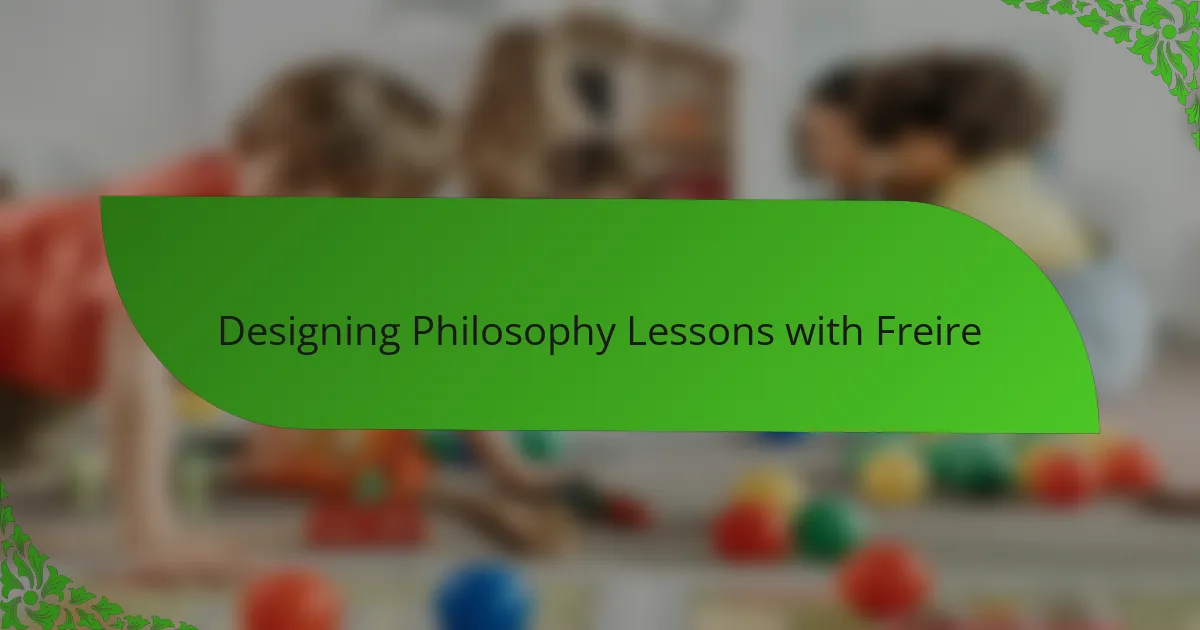
Designing Philosophy Lessons with Freire
Designing philosophy lessons with Freire’s ideas means shifting from delivering answers to sparking questions. I often start by inviting students to share their own experiences related to philosophical themes, which instantly makes the discussion more alive and grounded. Have you noticed how personal stories can unlock deeper thinking and curiosity in ways abstract concepts sometimes can’t?
Another aspect I’ve embraced is structuring lessons as dialogues rather than lectures. It’s tempting to prepare neat explanations, but letting the conversation flow freely uncovers insights none of us anticipated. The classroom becomes a community of thinkers rather than a one-way transmission of knowledge—don’t you find that dynamic more inspiring?
Finally, I continuously weave in moments for reflection and action, urging students to connect ideas with their lived realities and consider how philosophy can empower change. This praxis isn’t always easy to facilitate, but witnessing students challenge assumptions and envision alternatives reminds me why Freire’s approach matters so much in philosophy education.
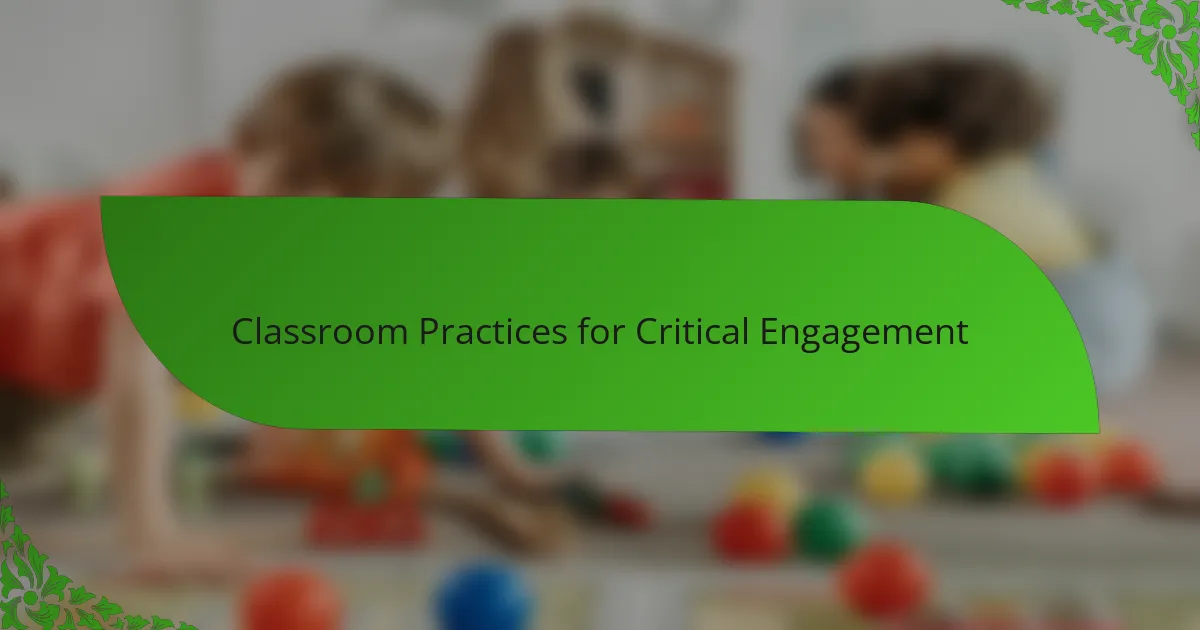
Classroom Practices for Critical Engagement
When I bring critical engagement into the classroom, I try to create moments where students feel safe enough to challenge not just ideas but also their own assumptions. One time, I asked my students to reflect on a common social issue, then share how it affected their own lives. The honesty and vulnerability that emerged made the discussion resonate far beyond theory.
I’ve noticed that encouraging students to question the origins and impacts of knowledge can be a powerful catalyst. Instead of accepting information at face value, we delve into who benefits and who might be marginalized. This practice often leads to lively debates, where learners don’t just consume content—they interrogate it.
Sometimes, I purposefully step back and let the conversation unfold with minimal intervention. It’s tempting to guide every discussion, but allowing space for uncertainty opens up unexpected insights. Have you ever witnessed a group of students surprise themselves by arriving at new understandings just through dialogue? That’s the essence of critical pedagogy in action.
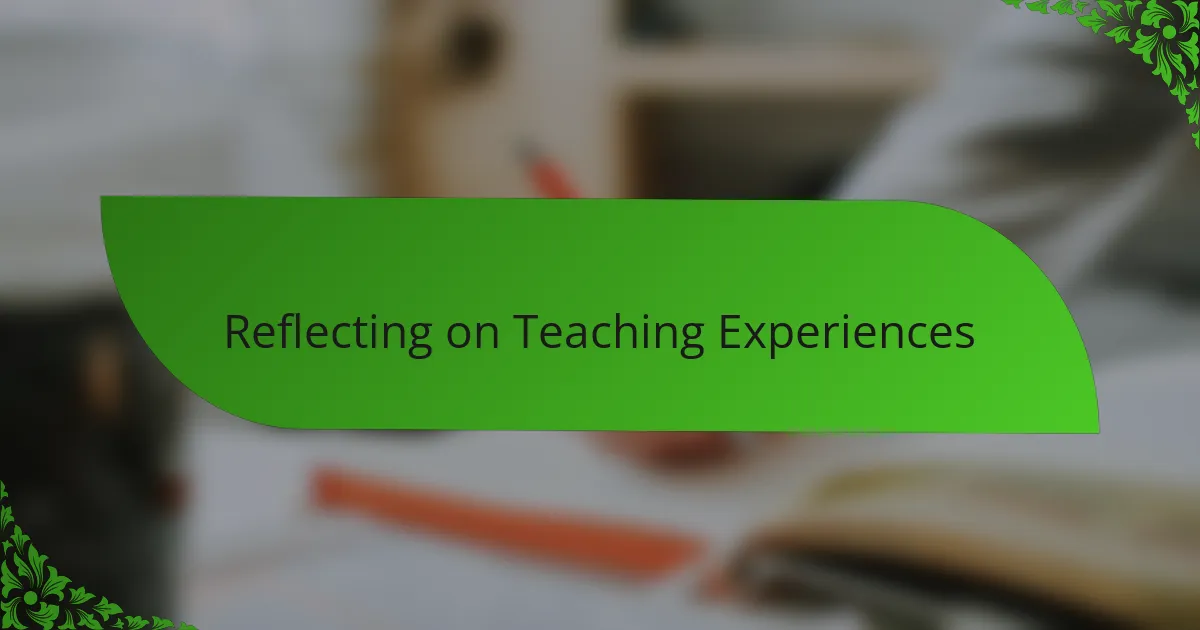
Reflecting on Teaching Experiences
Reflecting on my teaching experiences, I often find myself replaying moments when students suddenly connect a concept to their own lives. Those instances of breakthrough aren’t just gratifying—they’re deeply humbling. Have you ever felt that quiet pause in class when a learner’s eyes light up, as if they’ve uncovered something meaningful on their own?
I’ve also come to realize that reflecting means acknowledging my own missteps. Early on, discomfort arose when discussions veered into uncomfortable places, yet those were precisely the conversations that sparked growth. It made me wonder: is discomfort the real catalyst for learning? From my perspective, embracing those moments has made me a more responsive and compassionate educator.
Sometimes, after a class, I sit back and ask myself what worked and what didn’t. Was I truly listening, or just waiting to speak? This habit of reflection transforms teaching from routine delivery into a dynamic, evolving practice. And honestly, I think that ongoing self-questioning is what keeps education alive and relevant.
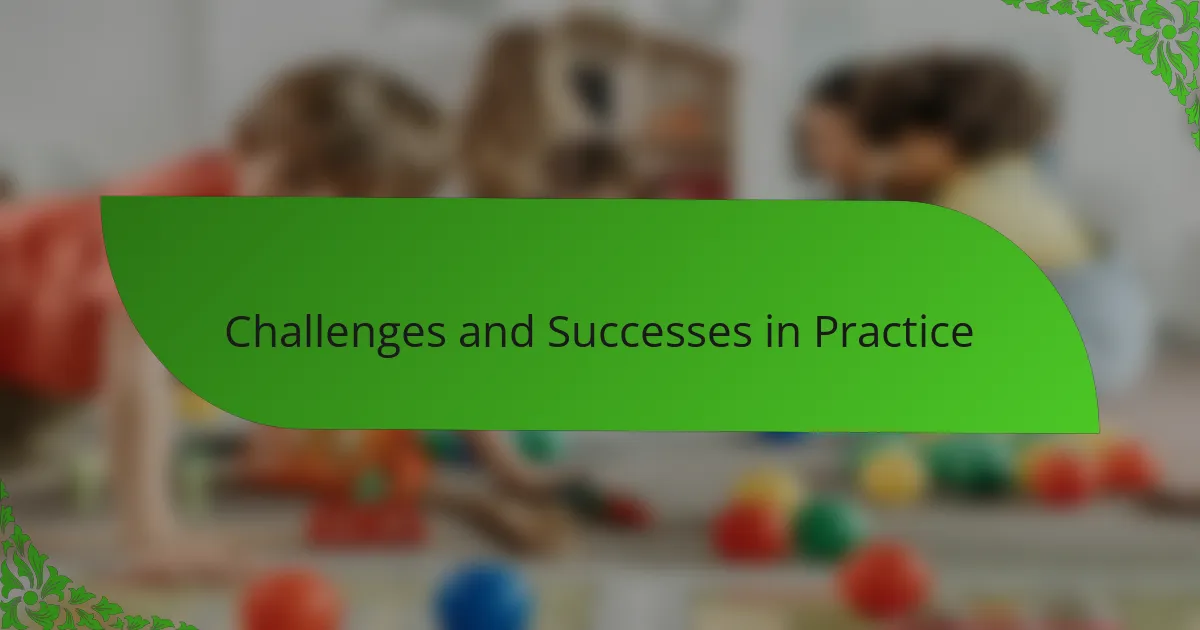
Challenges and Successes in Practice
Navigating the practical application of critical pedagogy often brought unexpected challenges. I remember feeling uneasy the first time I deliberately stepped back during a discussion, resisting the impulse to steer it. That vulnerability was uncomfortable, but it created space for genuine dialogue, and witnessing students take ownership of their learning was incredibly rewarding. Have you ever experienced that moment when letting go feels like the hardest part yet also the most freeing?
Yet, success doesn’t come without hurdles. Sometimes, resistance emerges—not just from students accustomed to traditional roles but within myself, wrestling with deeply ingrained habits of control. Overcoming that internal barrier required patience and constant reflection. I found that celebrating small victories, like a student’s insightful question or a moment of collective critical thinking, made the struggle worthwhile. Doesn’t that kind of progress, though incremental, feel more impactful than quick fixes?
Looking back, these experiences taught me that successes in practicing critical pedagogy are often subtle but profound. They show up in shifts of attitude, heightened awareness, and a classroom climate that values every voice. Isn’t that the very essence of Freire’s vision—education as an emancipatory practice rather than a simple transfer of knowledge? It’s messy, it’s imperfect, but it’s definitely worth the effort.